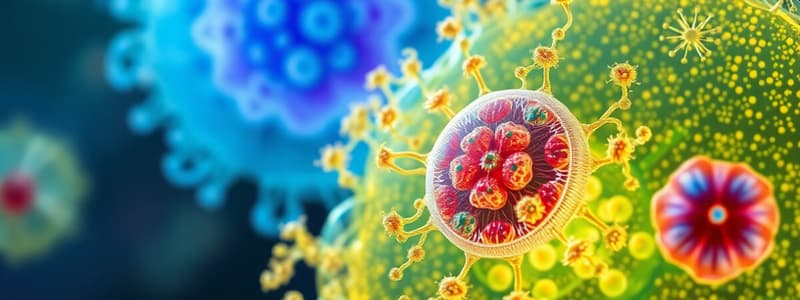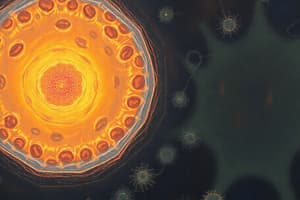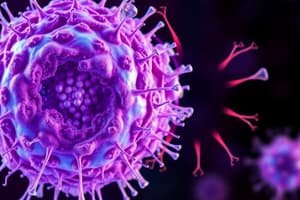Podcast
Questions and Answers
Which cell type is characterized by the absence of a nucleus?
Which cell type is characterized by the absence of a nucleus?
- Prokaryotic cells (correct)
- Fungal cells
- Eukaryotic cells
- Plant cells
What is a primary characteristic of eukaryotic cells?
What is a primary characteristic of eukaryotic cells?
- They are unicellular
- They have genetic material in cytoplasm
- They contain a nucleus (correct)
- They lack membrane-bound organelles
Which kingdom do prokaryotic cells belong to?
Which kingdom do prokaryotic cells belong to?
- Monera (correct)
- Fungi
- Animalia
- Plantae
What is a function of chloroplasts in plant cells?
What is a function of chloroplasts in plant cells?
Which of the following statements about fungal cells is true?
Which of the following statements about fungal cells is true?
What best describes protists?
What best describes protists?
Which component is NOT typically found in prokaryotic cells?
Which component is NOT typically found in prokaryotic cells?
What distinguishes eukaryotic cells from prokaryotic cells?
What distinguishes eukaryotic cells from prokaryotic cells?
Flashcards
Prokaryotic Cell
Prokaryotic Cell
A simple, single-celled organism without a nucleus or membrane-bound organelles.
Eukaryotic Cell
Eukaryotic Cell
A complex cell containing a nucleus and membrane-bound organelles.
Monera Kingdom
Monera Kingdom
The kingdom that houses prokaryotic cells (bacteria).
Plant Cell
Plant Cell
Signup and view all the flashcards
Animal Cell
Animal Cell
Signup and view all the flashcards
Fungal Cell
Fungal Cell
Signup and view all the flashcards
Protist
Protist
Signup and view all the flashcards
Cell Specialisation
Cell Specialisation
Signup and view all the flashcards
Study Notes
Cells
- All organisms have cells that specialize.
- Cells are categorized into two groups: prokaryotes and eukaryotes.
Prokaryotic Cells
- Prokaryotic cells are simpler than eukaryotic cells.
- Prokaryotic cells are single-celled organisms.
- Prokaryotic cells lack organelles and a nucleus.
- Prokaryotes belong to the kingdom Monera.
- Examples include bacteria.
- Genetic material (DNA) is free in the cytoplasm.
Eukaryotic Cells
- Eukaryotic cells are more complex.
- Eukaryotic cells contain both a nucleus and organelles.
- Eukaryotic cells belong to the kingdoms Animalia, Plantae, Fungi, and Protista.
- Eukaryotic cells keep genetic material inside the nucleus.
- Most eukaryotes are multicellular.
Plant Cells
- Plant cells use chloroplasts to photosynthesize.
- Plant cells have cell walls for support.
- Many plant cells store nutrients in large vacuoles.
Fungal Cells
- Fungi, unlike plants, lack chloroplasts, preventing photosynthesis.
- Fungi absorb nutrients from the environment.
- Fungi typically do not have large vacuoles filled with liquid.
Protist Cells
- Protists are a diverse group of mostly unicellular organisms.
- Some protists are photosynthetic.
- Some protists consume other organisms.
- Protists can cause diseases.
- Their shape and structure are adapted to their environment and food sources.
Animal Cells
- Animal cells are multicellular.
- Animal cells communicate and work together.
- Animal cells have different sizes and shapes depending on their function.
- Animal cells contain a nucleus and organelles, though they lack chloroplasts and cell walls.
Studying That Suits You
Use AI to generate personalized quizzes and flashcards to suit your learning preferences.




